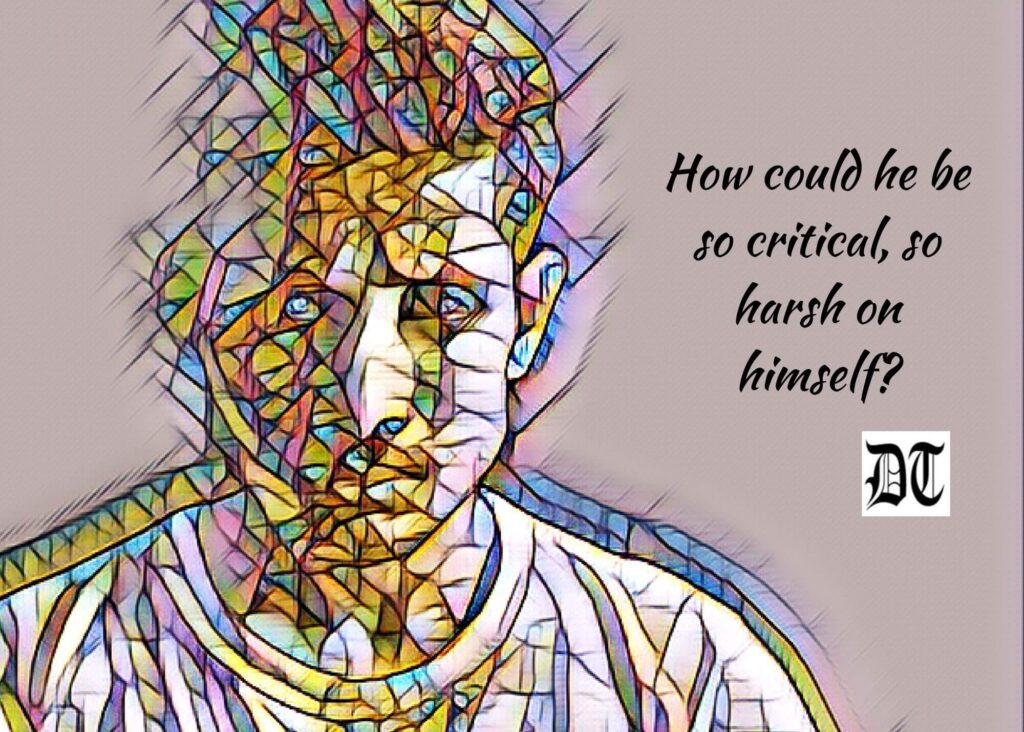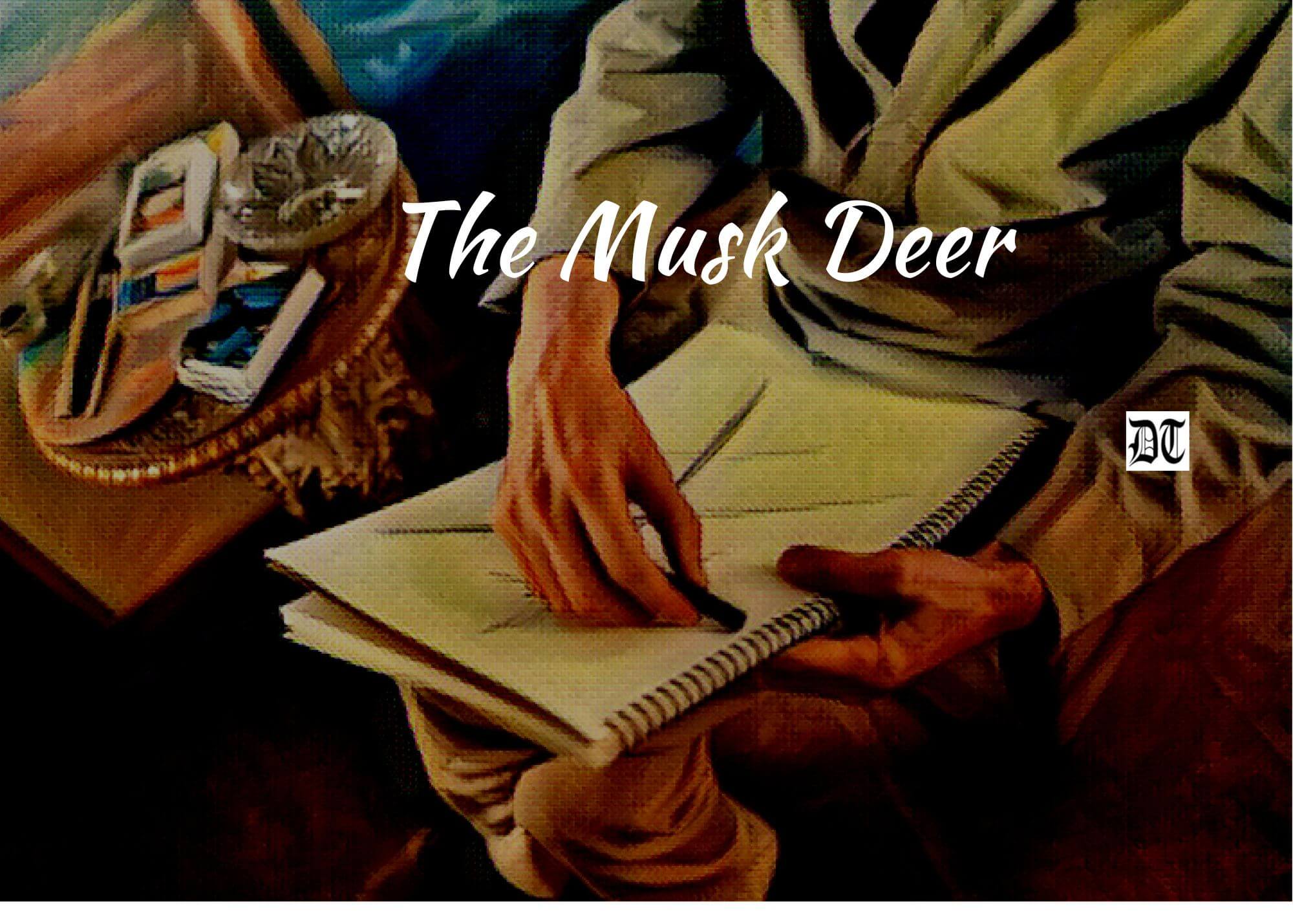An intriguing short story by Sujata about an artist and his suicide. What did his sketchbook reveal? The story unfolds – exclusively for Different Truths.
Durga Prasad looked around his rented flat in the metropolis. With his long legs, he had only to take a few strides to cover the entire flat. The hall, the bedrooms, and the kitchen together could not measure up to the rear veranda of his ancestral home. The bedroom window in his opulent house in the village faced shady trees of jamun (blackberry), and the windows in this apartment overlooked the service lane, which separated another row of ugly flats. Looking across, he could see a mother pig and a baby pig sitting idly on the garbage heap lined the lane monotonously.
The mother pig got up and shook itself free of the crow, which had comfortably settled on its back. What a funny sight! But Durga Prasad couldn’t laugh. He had forgotten how to laugh. Why had he come so far from his beautiful home to such an ugly flat? Beautiful home? Yes, it had been until recently. But now, it was a haunted house. The haunting presence of the absences: was what had driven him away from home. The long corridors and the spacious verandas… The pattering feet of Mukund and Somu chasing each other. Behind the tall, fluted pillars, little Somu played hide and seek. Bharati, calling out to them in her shrill voice to come and have milk.
Bharati, you have not been in my thoughts for a while. Do you see the photograph on the mantelpiece? Mukund and Somu, tall and broad-shouldered, in their black coats and caps as law graduates. That was what you had dreamed for them. When Somu decided to give up his job in the city, I wasn’t worried. Why should he slog in a firm for a petty boss? I had earned enough money for my sons, and there was enough work at home. I couldn’t have managed all those books I had published during the past two years without Somu. What a way he had with words! My prosaic analyses of lawsuits and criminal cases, with a few touches here and there, he transformed into inspiring stories. I couldn’t bear to enter the library. I had to close it down and seal it. I saw him everywhere: perched on the ladder, reaching out for books; sitting behind the tall lamp, bent over the manuscripts; stretched on the carpet, looking idly up at the ceiling… Oh! He was everywhere.
I couldn’t look at the little boys and the housewives around the neighbourhood either. They brought back a flood of memories. To the children, he was the big brother. He prepared badminton courts and football grounds for them. Every festival season, he would arrange cricket matches for them. He returned from his monthly visits to the town like Santa Claus, carrying for each one of them a gift: a paintbrush, a mask, or cartoons. And as for the women, he was their man Friday. He repaired their sluggish gadgets and fixed erring electrical points for them. And the servants adored him. They would run to him for any medical problem, a quarrel with a neighbour, or a land dispute. He had no enemies. Everyone loved him; he was so happy and full of life. That is what intrigues me…
Why did he do it? Bharati, I have no face to show you. You left me to take care of your teenage sons. Believe me; I did keep my promise to you. They were brilliant at school. Both went to university with scholarships. I gave them all my love, and they had everything money could buy. They seemed happy. I gave them enough freedom. They never gave me a reason to question them. My friends often wondered how I had managed to bring them up so well, single-handedly. I was so proud! Yet… Somu missed something. I must have failed him in some way. Or else, he wouldn’t have done such a thing.
Bharati, I used to think you were unlucky. You had missed all the fun and pride of seeing your sons reach the prime of their lives. But now I know why you have gone before me. A gentle soul like you, God wished to spare you from this agony. I was always proud of my judgments. Wasn’t I? I had thought I was meting out justice to the wronged ones…Before I put my signature to one of those capital punishments, I spent sleepless nights thinking and rethinking, weighing the pros and cons. Yet that one signature of mine could have… must have harmed many lives! How many mothers, fathers, and wives must have cursed me? Yes, I am convinced now. Or else, I wouldn’t have faced this ordeal, this anguish of seeing my son at the end of a rope!
Bharati, you will be surprised to know what was the first thought that crossed my mind. I thought clinically, dispassionately, as I would at one of the criminal cases, the body had to be sent for post-mortem. And then a shooting pain went through my head. My son, mutilated, cut up and cobbled… No….I couldn’t let that happen. Bharati, for the first time in my life, I thought of bribing. God is my witness. I thought you wouldn’t have forgiven me if I had done that. Poor Mukund managed everything. The suicide note left by Somu, and the rope, they said, were enough to prove that there was no foul play. Bharati, why did Somu do this to me? Where did I go wrong? I must know. I have told Mukund to look into every sheet of paper in Somu’s cupboard. Let him ransack Somu’s room. But he must find out why Somu did such a thing…
Going through Somu’s belongings was something Mukund had been evading for the past year.
Going through Somu’s belongings was something Mukund had been evading for the past year. The bookshelf had collected layers and layers of fine sooty dust. Mukund ran his eyes around the room. The walls were bare. The easels on which Somu had done his oil paintings-garish looking goddesses (Mukund used to tease him that they resembled famous film stars) and a few splashes of colour in glaring geometrical motifs, which he liked to call modern art, had all been taken down. Father had taken them to Delhi and had hung them in his room. For my father, Somu was Picasso and Leonardo da Vinci all rolled into one.
Mukund had never seen his father so distraught. The authority, the confidence with which he used to go around-all gone. He refused to speak to the friends who called on him. Even to the servants, he mumbled as though he was afraid to talk to them. How could Mukund console his father when he felt so shattered? Somu, who was just a year younger than him, was not only his brother but also his best friend and companion. Clearing the cobwebs, he walked around the room. When Somu and he were kids, when their mother was alive, he shared this room with Somu. His cot faced the wall, and Somu’s had faced the window.
I used to wake up in the middle of the night and listen to Somu’s singsong voice – Barah duni chaubees, Barah tiya Chhattees, chanting the multiplication tables tunefully. Sometimes, he would recite a poem that had perhaps been taught that day at school. He never got over the habit of talking in his sleep. When we were at the law school, the fiery arguments with which he argued his cases used to keep me awake all night. I didn’t have to read books. I had to listen to him at night to get through my exams.
Somu’s sleepwalking was another big joke that went around our family circle. He would get up in the night, pick up his books, shove them into his bag and get out of the room. Mother or father, or one of the servants, would bring him back and quietly put him to bed. I still vividly remember the day he got up from the bed and started running in the corridor. It was the month of Ashadh. The river in our village was in full spate. All evening, we boys swam from one end of the river to the other or spent our time diving and taking dips. I went after him to bring him back to the room. Before I could catch him, he leapt over the railings and went diving into the courtyard. But nothing happened to Somu. It was a miraculous escape. We brought him back to the bed all in one piece. But how mother wept that day! She took him to a doctor, but his medicines didn’t work on him. Then she got a hakeem home, and it was his powders and pills finally cured Somu of his sleepwalking.
Rows and rows of books. Mukund pulled them out of the shelves. He threw open all the cupboards. The neatly stacked clothes, check and striped shirts, and ties hung on a string on the inside part of the door. He felt like he had come into the room to borrow a shirt from Somu. A whiff of Brute, Somu’s favourite cologne, hit Mukund. He put his hands on his face and sank to the floor. It wasn’t going to be easy going through Somu’s belongings. But he had to do it. Father had asked him to do so.
Mukund dusted the books and piled them on the side. Somu never wrote diaries.
Mukund dusted the books and piled them on the side. Somu never wrote diaries. He had often dismissed diary writing as the hobby of sentimental women. Where could he look for clues? He was at a loss. On the lower shelf, Somu’s sketchbooks had been neatly arranged. Somu was very fond of making sketches. You never knew when or how he would arrest you on a page. Mukund idly flipped through the book. His spirits lifted as he found himself drawn across the pages. Suited and booted, he was seated on a bench in University Park. His slightly crooked nose had been made to look like a hook. And then he took note of his expression: open-mouthed, he was staring at a pair of girls looking into the fishpond on the other end of the park. Mukund chuckled.
I never chased girls. Either I was lazy or too shy. I usually stayed away from girls. But it is amusing to learn how Somu had visualised me.
On another page, the father is in the court, sitting in the judge’s seat. The scar on his jaws has given such prominence that it looked like he had a cleft chin. Oh, God! What was he doing in the courtroom? He was puffing at a hookah! Father never smoked. What was Somu up to? I never knew he had a flair for cartoons! Mother’s sketch was not a cartoon. She sat in front of the mirror, garlands on her hair loaded with jewellery. But Mukund had never seen her that way.
Another sketchbook opened with a picture of a boy. He didn’t resemble anyone Mukund knew. Ahead of him was a shadow, the boy’s shadow; he seemed to be chasing his own shadow. Below the picture, Somu had scribbled:
Dr Jekyll had to down a concoction to become Hyde. I can do it so simply. Please take a look at that shadow. I will give life to it.
Mukund turned the pages. Somu had made self-portraits too.
Mukund turned the pages. Somu had made self-portraits too. Whip in hands, he was chasing workers in a maze field, a beggar with a bowl. And Somu was kicking him away. Mukund was puzzled. Art, he thought, was the expression of one’s genuine self. Somu was always kind to each one. Then why had he portrayed himself so differently? A little disturbed, he turned the pages. Somu stared at him from every page- a lecherous smile, a frown, a sneer, and glaring eyes, eyes popping out in surprise, a face distorted by anger. So many faces of Somu! What did all this mean?

Nava rasa or a multifaced demon? Ha ha ha!
Somu’s caption intrigued Mukund. How could he be so critical, so harsh on himself?
The next sketchbook was a mixture of landscape and portraits. There were no caricatures. Some of them were beautifully coloured. Mukund looked at the boys playing on the football ground. On the next page was an amusing picture. The ladies from the neighbourhood were busy squeezing mangoes and spreading the pulp on the mats. The bright sun was stationed right above their heads. Mukund looked for the scarecrow. Yes, it was there. When they were little boys, during the mango season, Somu and he used to help the ladies make mango papads. Somu would put up the funniest possible scarecrows for them. A big bowl full of fresh mango pulp was what they got as a reward for their labour. The good old days…
Yet another homely scene – a young girl was milking the cow, the white cow with black spots, which gave the maximum milk for the house. The girl looked familiar.
Where had he seen her?
The same girl is in different poses on the next page and the next page.
The same girl is in different poses on the next page and the next page. Yes… now he could recognise her. For sure, it was the youngest daughter of their cook. Gathering the pallav of her sari, which had slipped off her shoulders, her luscious youthful figure delicately outlined, she looked like a seductress. There were a few more pictures of yet another girl, a little short and stout but attractive, standing with books in hand in front of a school building. Mukund was sure he had never seen this girl. And he saw Somu’s scrawl highlighted. Wasn’t it a nursery rhyme?
Georgy Porgy pudding and pie,
Kissed the girls and made them cry.
When the girls began to smile,
Georgy Porgy ran away.
The following picture was absolutely out of this world.
Three golden deer in a lush green grove. They seemed to be on the run. The one with the three-pronged antlers running ahead of the other two appeared to be the stag. The two behind him, slightly smaller in size, looked like females.
They trail me as though I am a musk deer
But where are the musk-pods?
Where is the musk?
The lines Somu had scribbled under them, were they from a poem? Mukund couldn’t place them. He had never been a voracious reader like Somu.
Mukund went back to the portraits of the young women. Would they know something about his brother, something that he did not know? The thought made him feel a trifle sad. But he couldn’t, and he shouldn’t rule out any possibilities. He didn’t want to go hunting down people like a detective. But father had sent him here to find the rationale for his brother’s death.
Finding the cook’s house was not a problem.
Finding the cook’s house was not a problem. Since my father left for the city, the ancestral home had been shut down. The cook, who had nothing to do, usually spent his afternoons playing cards or gossiping with the unemployed men of the neighbourhood. As Mukund entered the house cook’s teenage son came running out to meet him.
‘Father is not at home.’ He said respectfully
‘Where is your sister?’
He looked at him blankly.
‘Where is Kammo? Is she not your sister?’
Mukund could hear shuffling footsteps. There was someone inside,
And, of course, there she was. Kammo. Standing in the doorway, with downcast eyes, her head discreetly covered with the loose end of her sari.
“‘You used to come to our house daily. Right?’
There was no answer.
‘Your duty was to milk the cows. Wasn’t it so”
She nodded.
‘What other work do you do in the house?’
‘I help my father in the kitchen,’ she said softly.
‘You knew my brother well. Didn’t you?”
‘Mukund’s question, so abruptly flung at her, must have caught her by surprise. She shook her head a vehement no. Mukund’s next move unarmed her. He flipped open the sketchbooks and pushed them under her nose.’ Here, is that not you?’
The girl trembled like a leaf and sagged on the floor…
‘Had I known he would do such a thing, I wouldn’t have told him that…’
She blurted out between sobs.
‘What did you tell him?’
Mukund’s voice was like a whip.
‘Oh! I told him I was carrying.’
She was weeping uncontrollably.
‘Where is the child?
Mukund was now screaming.
‘There was no child.’
She buried her face in her hands, fell at his feet, and collapsed.
I just thought I would scare him. Thought
he might even consent to marry me!’
Mukund stared at her in stunned silence. It took him some time to figure out the import of her words. Then he pushed the portrait of the other woman towards her.
‘Do you recognise this woman?’
Mukund could trace a flash of anger in Kammo’s eyes.
‘Yes, I have seen her. She is a teacher at a government school. Two years ago, she came to the village.’
It took a couple of days to track down the teacher. She lived at the river end of the village with her ailing old father.
It took a couple of days to track down the teacher. She lived at the river end of the village with her ailing old father. The teacher vehemently denied she had ever known Somu. Mukund quietly put forward the sketchbook. Her defiant, level eyes were immediately lowered.
‘Yes, he was my friend,’ she whispered almost inaudibly.
‘Only a friend, or much more than that? How often did you see him?’
‘He used to visit me on weekends.’
‘When did you last see him?’
Her face was death pale. Her eyes glinted unnaturally. She pursed her lips together as though she would seal them.
‘You must tell me all about it. I must know. I am his brother.’ Mukund reasoned with her.
‘I would rather not speak.’
‘In that case, I may have to summon you to the court.’
Mukund now had to resort to threats.
She shrank to the corner of the sofa, covered her face with both her hands and spoke softly not to Mukund but herself.
“He never talked about marriage. Whenever I broached the subject, he would laugh it off.”
So I told him….'”
“What did you tell him?”
“I told him… I was pregnant.”
‘Where is your baby?
‘Baby? The baby was a myth… I thought that would make him own me…’
She mumbled as though in delirium.
‘When did you tell him this?’ Mukund asked her in a shaky voice.
“The day before his death. Yes… I have sent him to his death. You must punish me for it. Take me to court. I will confess…”
Her voice was loud now, almost hysterical.’
Blinded by tears of sorrow, shame, or anger, Mukund didn’t quite know – he groped his way out of the house, leaving the woman behind to rave and rant.
When Anand’s car came screeching down the gravelled path and pulled into the driveway, Mukund was pacing up and down in the garden.
When Anand’s car came screeching down the gravelled path and pulled into the driveway, Mukund was pacing up and down in the garden. He had forgotten entirely about Anand. His cousin Anand was a doctor who had a flourishing practice in the city. He had promised Mukund he would drive down to the village for the weekend. The idea of spending days and nights in an abandoned house, even though it was his own dear home, had initially scared him, and he had requested Anand to take a few days off and join him.
It was a great relief to have Anand around. Across the dinner table, Mukund narrated the harrowing tale of his scouting. The sordid shameful story he had stumbled on. Anand choked on a fish bone that he had swallowed in haste. Mukund made a giant round rice ball and pushed it down Anand’s throat. ‘Come on. Gulp it down in one single breath,’ Mukund ordered affectionately. Mother used to do that whenever he or Somu had swallowed a fish bone. Anand chased the ball of rice with a glass full of chilled water and cleared his throat.
“What did you say, Mukund? Somu ruined two women? Impossible! Let me tell you a secret, a professional secret. I would have never divulged it had you not told me this. Do you know why Somu gave up his job in the city and joined his uncle here? He had come once to the hospital to see me. People were standing in a queue, waiting for a potency test. Somu jokingly said, ‘Let me also test’. When the results came, I had no heart to tell him the truth. But he insisted on knowing it. So, I told him he couldn’t ever father a child for any woman, Mukund.’
Mukund felt dazed. Somu was not capable of fathering a child, and he knew it! What did that mean? He knew the two women were lying to him. He could have exposed them any day. Then, why should Somu end his life? Mukund turned to his cousin.
“They loved him desperately! So much so that they didn’t mind telling such a big lie to stake their claim on him. That is frightening! Such a demanding love… Maybe…”
Maybe! Mukund was not convinced. He wrung his hands in exasperation.
They trail me down as though I am a musk deer
But where are the musk pods?
Where is the musk?
Once again, the lines came back to haunt him. His father was anxiously waiting for him to bring some news. What could he tell him? Should he tell him he had found no clues? Better leave Somu’s death a mystery? And his life?
Picture design by Anumita Roy, Different Truths





 By
By
 By
By
 By
By
 By
By
Sankranti’s short story is a finely crafted portrait of loss, pain and intrigue. Thoroughly enjoyed reading it. May this talented writer spin many many more short stories that hold similar charm and sentiment. All the best.